




- BRNN
- BRI News
- BRNN News
- Database
Official Documents Polices and Regulations
Inter-government Documents International Cooperation BRI Countries
Business Guide Economic Data BRI Data
Trade
Investment Projects Latest projects
Cases - Content Pool
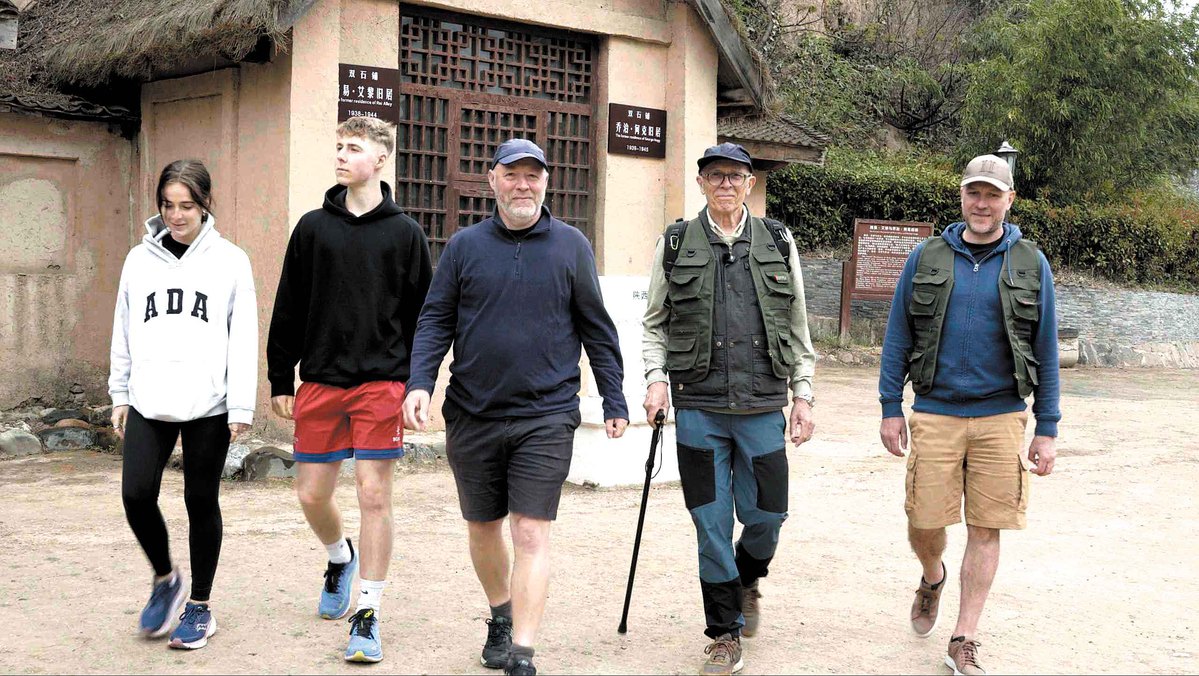
Members of the Society for Anglo-Chinese Understanding visit the house where British journalist George Hogg once lived in Shuangshipu, Shaanxi province, during a tour this year. CHINA DAILY
On Saturday, May 15, 1965, Joseph Needham addressed a packed assembly hall in Church House Westminster, central London, to announce the birth of "an organization for fostering friendship and mutual understanding between the British and the Chinese people".
The renowned Cambridge University biochemist and science historian recounted his friendship with visiting Chinese scholars, his study of the Chinese language, and his scientific and technological liaison mission during World War II in Chongqing, the country's wartime capital in Southwest China.
"One must always remember that China is not simply a different country from our own … but a different civilization," he told an audience that included bishops, members of the parliament, professors, artists, writers, and trade union leaders.
At the time, the People's Republic of China was isolated — not recognized by the United States and mired in a deepening split with the Soviet Union. Although Britain had established diplomatic relations with China in 1954, it still opposed Beijing's entry into the United Nations.
"There is thus a much greater gulf of fundamental assumptions to be bridged, as well as all the fascinating differences that arise in philosophy, art, landscape, religion, customs, and so on," continued Needham, who had already published the early volumes of Science and Civilisation in China, the first comprehensive work to celebrate China's scientific achievements and their connections to global knowledge, in contrast to Eurocentric histories of science.
"This requires a real effort toward understanding, the very purpose of our new society," he said.
It was named the Society for Anglo-Chinese Understanding, or SACU, which, in the following decades, played a vital role in people-to-people exchanges between China and the United Kingdom.
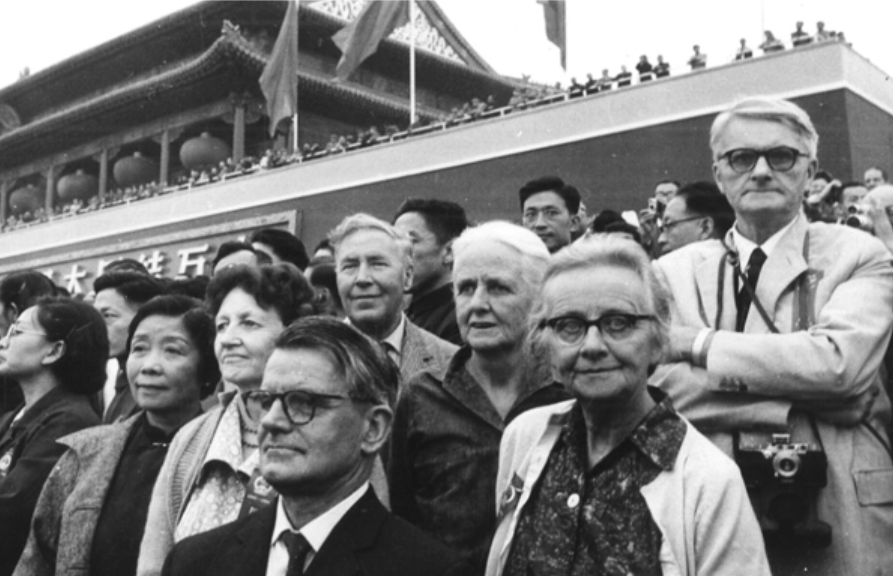
Members of SACU attend the 15th Anniversary of People's Republic of China at Tian'anmen Square in Beijing. CHINA DAILY
Anniversary celebration
Fast forward to a recent Saturday in late September. Around 200 people are gathered at King's College London, a mix of scholars, diplomats, writers, artists, students, and businesspeople. Like those who had listened to Needham's speech in 1965, all of them shared a deep interest in China.
They had come to celebrate the 60th anniversary of SACU.
Among the attendees was Ravi Bhoothalingam, now an emeritus fellow at the Institute of Chinese Studies in Delhi. As a young science student at Cambridge University in 1965, he studied at Gonville and Caius College, where Needham was president, and encountered SACU in its earliest days.
Bhoothalingam recalled that he knew little about China but was curious about the country. Needham showed him his collections from China, and once took him and several students to an early SACU meeting at Jesus College. The guest speaker, an ethnomusicologist, played the erhu, a Chinese two-stringed instrument, and explained the foundations of Chinese music and how they differed from Western traditions.
"At the end of the meeting, the professor invited us to join the new society," Bhoothalingam said. "Needham gave me a nudge, and I signed up. But as a student, I had very little money, so Needham kindly paid my fee — that's how I became a member of SACU in 1965."
Bhoothalingam's story captures something essential about SACU that has endured through the years — it was a community built on curiosity, friendship, and a desire to promote understanding through cultural exchanges.
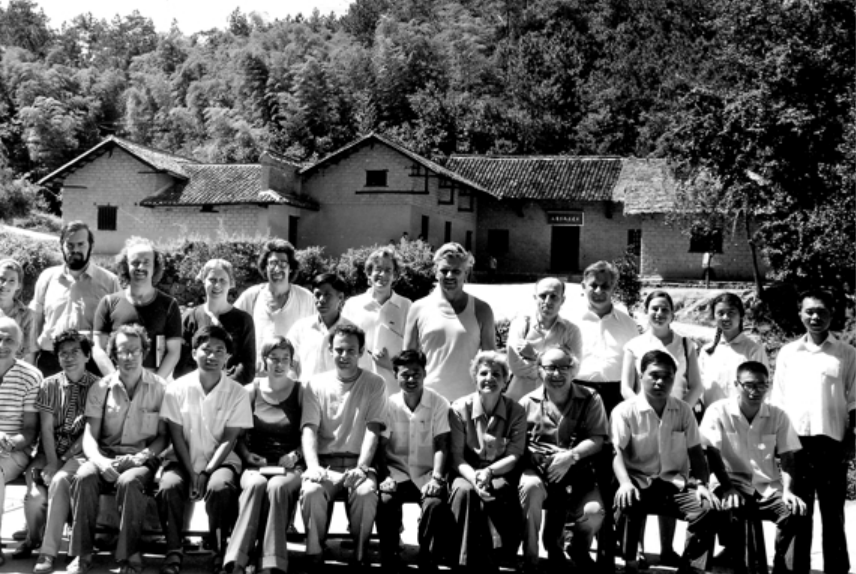
Members of the 1973 SACU China Tour group pose for a photo in front of the late Chairman Mao Zedong's house in Shaoshan, Hunan province. CHINA DAILY
Tours to China
Almost all of SACU's core activities took shape in its first years including public conferences, film screenings, discussion meetings, Chinese language classes, and, most notably, its tours to China.
In the 1970s, these tours offered one of the few ways for ordinary Britons to see the country with their own eyes.
Frances Wood — a sinologist, historian, and former lead curator of the British Library's Chinese collections — joined SACU's first youth tour to China in 1971.
"What I liked most was simply seeing China and meeting people," she recalled. "I would wander out into the villages where we stayed, walk around and talk to people."
Wood, who had begun studying Chinese at Cambridge in 1967, admitted she "had lots of silly times" on the tours, visiting people's communes and trying to understand daily life.
"I remember once, near Hongqiqu in Henan province, I suddenly realized a whole village was following me because of my foreign appearance," she said. "They would ask, 'Have you eaten?' — and not knowing it was just a greeting, I would tell them everything I had eaten! I didn't realize I should simply answer, 'Yes, I have'."
That early curiosity never left her. Wood went on to publish widely on Chinese history, from Marco Polo and the Silk Road to the first emperor of China, always seeking to illuminate the bigger picture through individual stories.
From the 1980s, China's opening-up sparked wider public interest, and SACU — through its links with the Chinese People's Association for Friendship with Foreign Countries — was able to expand its tours. By 1985, the society said more than 10,000 people had been members at one time or another.
Keith Bennett, a researcher on China's international relations and co-founder of Friends of Socialist China, remembered vividly those years as SACU's most dynamic period.
In 1979, fresh out of the School of Oriental and African Studies, the University of London, where he studied Chinese history and politics, Bennett joined SACU to work on its publications. Two years later he embarked on his first visit to China with the society.
"I can still remember the itinerary," he said. "We flew to Hong Kong and went by train to Guangzhou (Guangdong province). Then we flew to Shanghai, and on to Hefei (Anhui province). From there we went out to the countryside and stayed on two communes, just as they were bringing in the household responsibility system … Finally, we made a long, long train journey — about 30 hours — from Nanjing (Jiangsu province) to Beijing."
Bennett has returned to China numerous times, and although he later moved on to other organizations, he has remained an SACU member.
Looking back on his first job, Bennett said he felt very lucky "because I could go to work every day to do something I believed in and loved doing". He added he was grateful for the "amazing people" he met — people who did brave things but remained modest about their contributions.
"Many organizations have come and gone, but not many organizations last for 60 years. So that's an achievement in itself," Bennett said.
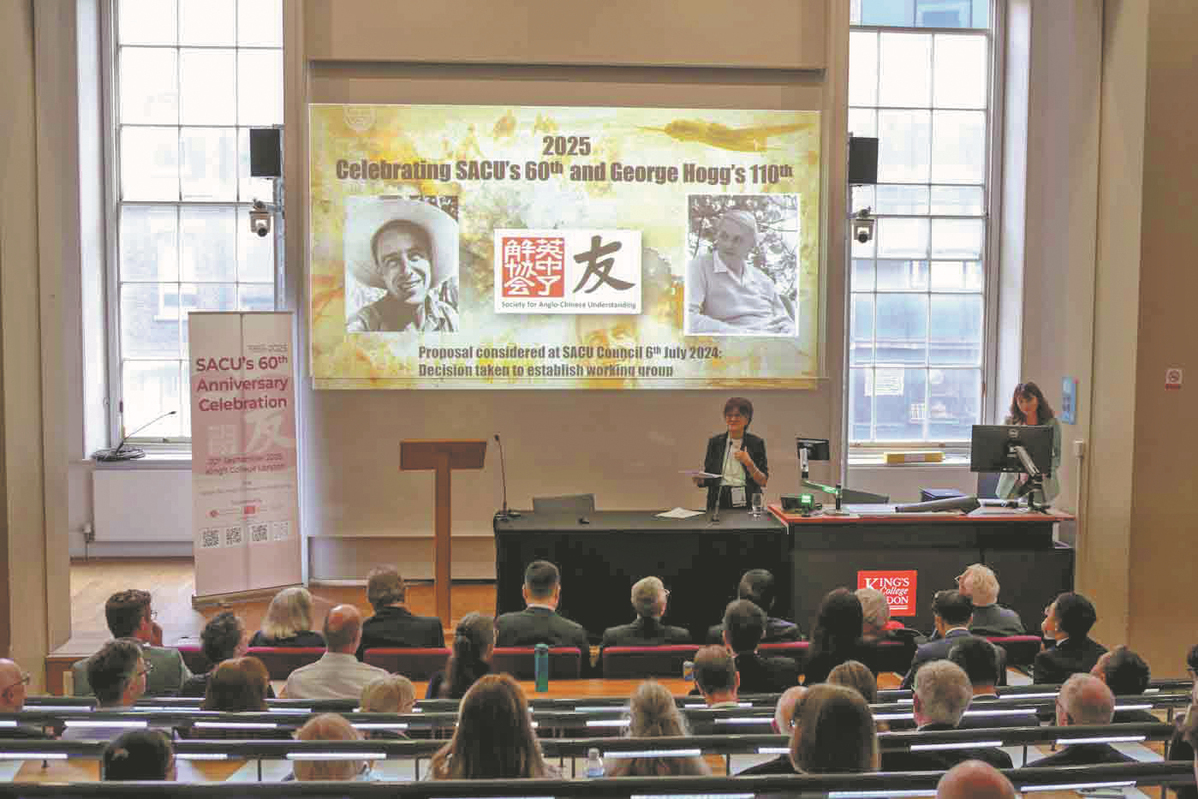
Zoe Reed, chair emerita of SACU, celebrates with members at the society's 60th anniversary in London on Sept 20. XING YI/CHINA DAILY
Counter to misrepresentations
Alongside its tours and public events, SACU also built a publishing presence. In the late 1960s, it founded a press and information group whose core members wrote letters to editors of British mainstream media, such as The Times, to correct factual errors and refute misrepresentations of China in reports.
In May 1970, it launched a monthly magazine, China Now, designed to provide Western readers with more in-depth discussions of developments in China. The magazine was renamed China in Focus in 1996, and since 2004 has appeared as China Eye.
The content of the magazines was mostly written by SACU members, with stories ranging from the latest news about China, announcements of upcoming lectures, book reviews and the first-hand reports about China written by members who had returned from the latest SACU tour.
For the past 21 years, Walter Fung has been involved in editing China Eye. He said he never tires of doing it.
"Because there's so much negative coverage of China in the daily press, I like to highlight the positives — China's achievements and the good things in people's lives," he said. "It's also about showing how, in many ways, life in China is just the same as anywhere else."
"I get real satisfaction from pushing back against the negative narratives," he added.
Li Linxi, a lecturer at the Communication University of China, said the society's publications have "great historical value" and past issues have been digitized. Li led the digital archive project of the SACU papers, which was put online in 2023.
"There are many important figures and moments in Sino-British cultural exchanges since the 1950s that are often overlooked in mainstream historical narratives," Li noted. "Through the lens of China Now and its successor magazines, we can re-cover stories that deserve to be remembered and cherished."
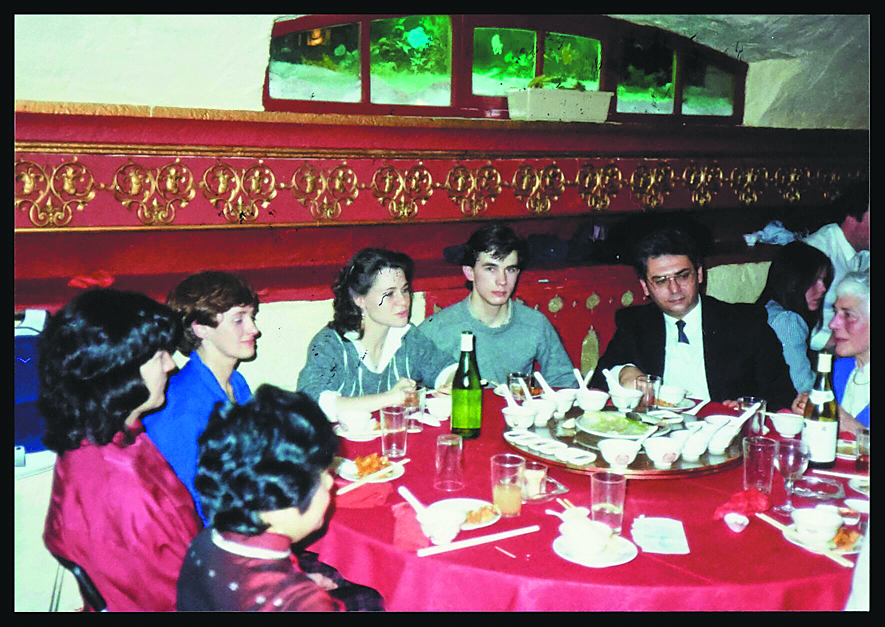
SACU members gather to celebrate the Chinese New Year in London in 1984. CHINA DAILY
Challenges and renewal
As China opened up more in the 1990s, the society faced mounting competition from commercial travel companies, while universities, cultural institutes, and other organizations began offering their own China-related events.
The rise of the internet and social media since the 2000s has also dented the readership of the society's publication, which now has subscriptions of only around 300.
Yet, with its unique history, prominent members, and high-level connections, SACU still has the ability to "punch above its weight," many attendees at the 60th anniversary event said.
In recent years, SACU has extended its presence in the UK through partnerships and events in Cambridge, Manchester, and Humberside, as well as London. At the same time, it has strengthened ties with organizations in China.
Education was one of the areas that Zoe Reed tried to steer SACU toward. Reed, who has served as SACU chair since 2009, outlined the organization's next five-year plan.
"We really want to be promoting education in partnerships. We need to get some strategic partners because we've all got to work together to create the context for a warmer reception for China and the Chinese people in this country."
One of SACU's flagship projects is a joint essay competition with Peking University that encourages UK high school students to research topics such as overcoming cultural gaps between China and the West, taking a historical view of China-UK relations, or exploring the concept of "harmony" in different cultures.
Sun Hua, director of Peking University's China Center for Edgar Snow Studies, was a partner on the project. He said the number of participating schools had expanded since the competition was launched at Needham's alma mater, Oundle School, Peterborough, in 2015.
"If we don't understand the past, we will have little hope of mastering the future," said Sun, who flew to London and presented awards to the student winners at the SACU anniversary. "I am very glad to be here to continue Joseph Needham's great work of increasing harmony and understanding between the Chinese and British People."
SACU has also set up an education fund to assist in the vocational training of people in cooperative business methods in rural Northwest China.
The fund was named in memory of George Hogg, a British journalist, friend of Needham, and the headmaster of the Bailie School in Shuangshipu, Shaanxi province, who dedicated his life to aiding the country during the Chinese People's War of Resistance Against Japanese Aggression (1931-45).
In 1944, to escape the threat of conflict, Hogg led over 60 students on a perilous trek westward from Shuangshipu to Shandan, a remote town in neighboring Gansu province, where they continued their studies. Tragically, on July 22, 1945, Hogg died from tetanus in Shandan.
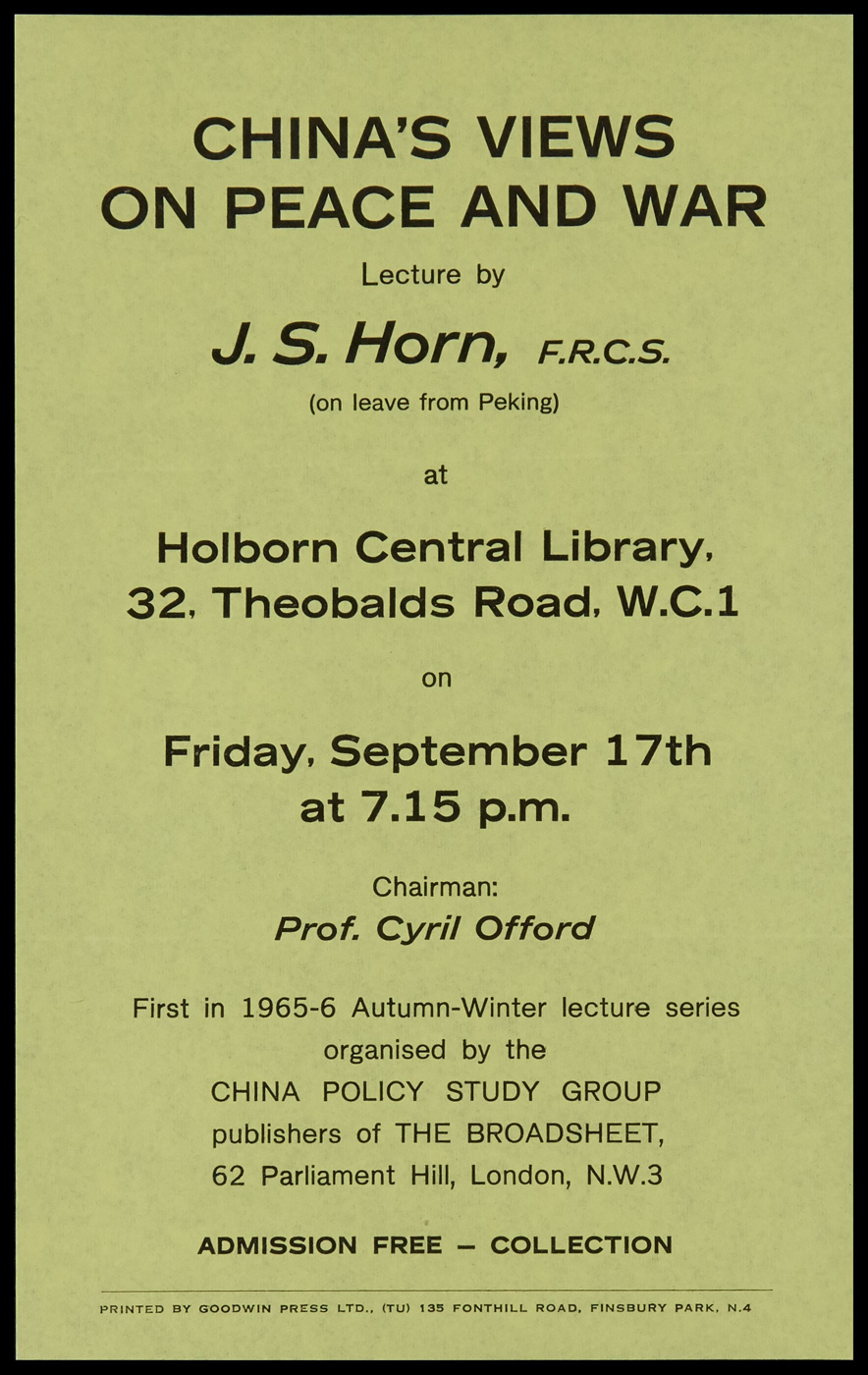
A 1965 poster promoting a China Policy Study Group lecture themed China's Views on Peace and War.
Story resumes
In April, the society organized a tour named "In the Footsteps of George Hogg" to mark the 80th anniversary of George Hogg's death. The tour retraced Hogg's journey from Shanghai to the Gobi Desert, and tour members participated in commemoration conferences in Lanzhou of Gansu, and Beijing.
Carrying forward the spirit of Needham, SACU continues to broaden the conversation about China in the UK by engaging with scholars, artists, and public intellectuals. Among those lending their voices is historian and broadcaster Michael Wood, who has served as the president of SACU since 2020.
A history professor at the University of Manchester and documentary maker, his works include the well-received book The Story of China: A Portrait of a Civilisation and Its People and the acclaimed BBC documentary Du Fu: China's Greatest Poet, which brought Chinese poetry and history to wide audiences.
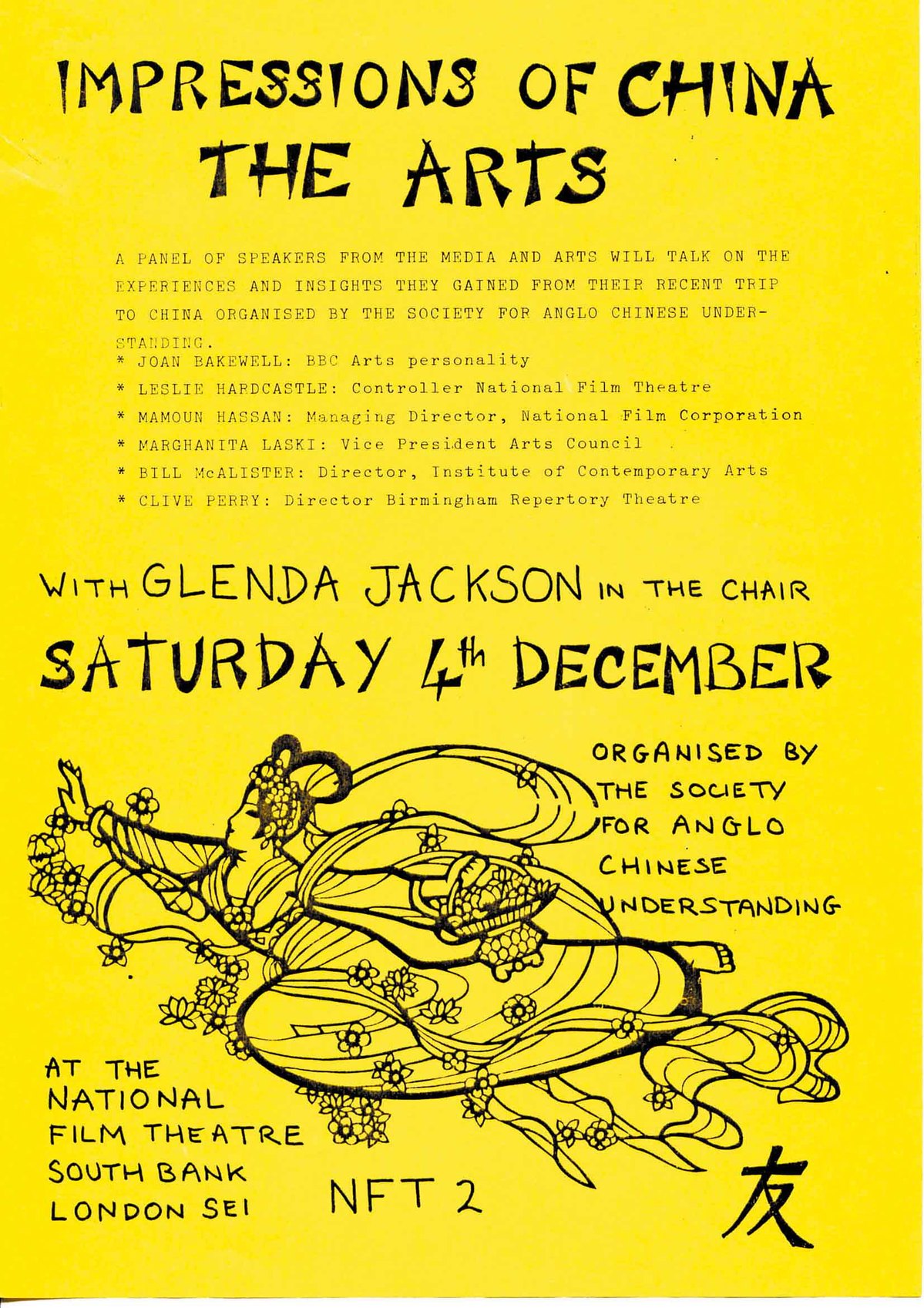
A 1976 lecture notice about artists' impressions of China after their trip to the country organized by the SACU.
Speaking at the anniversary celebration, Wood told a room filled with both longtime members and newcomers: "Now China is not only an economic giant, but a political and cultural giant, too. It's essential for us to understand it better. That was the key motive of the farsighted founders of SACU, who foresaw the independent and prosperous China that could arise and make the future that we're now living in."
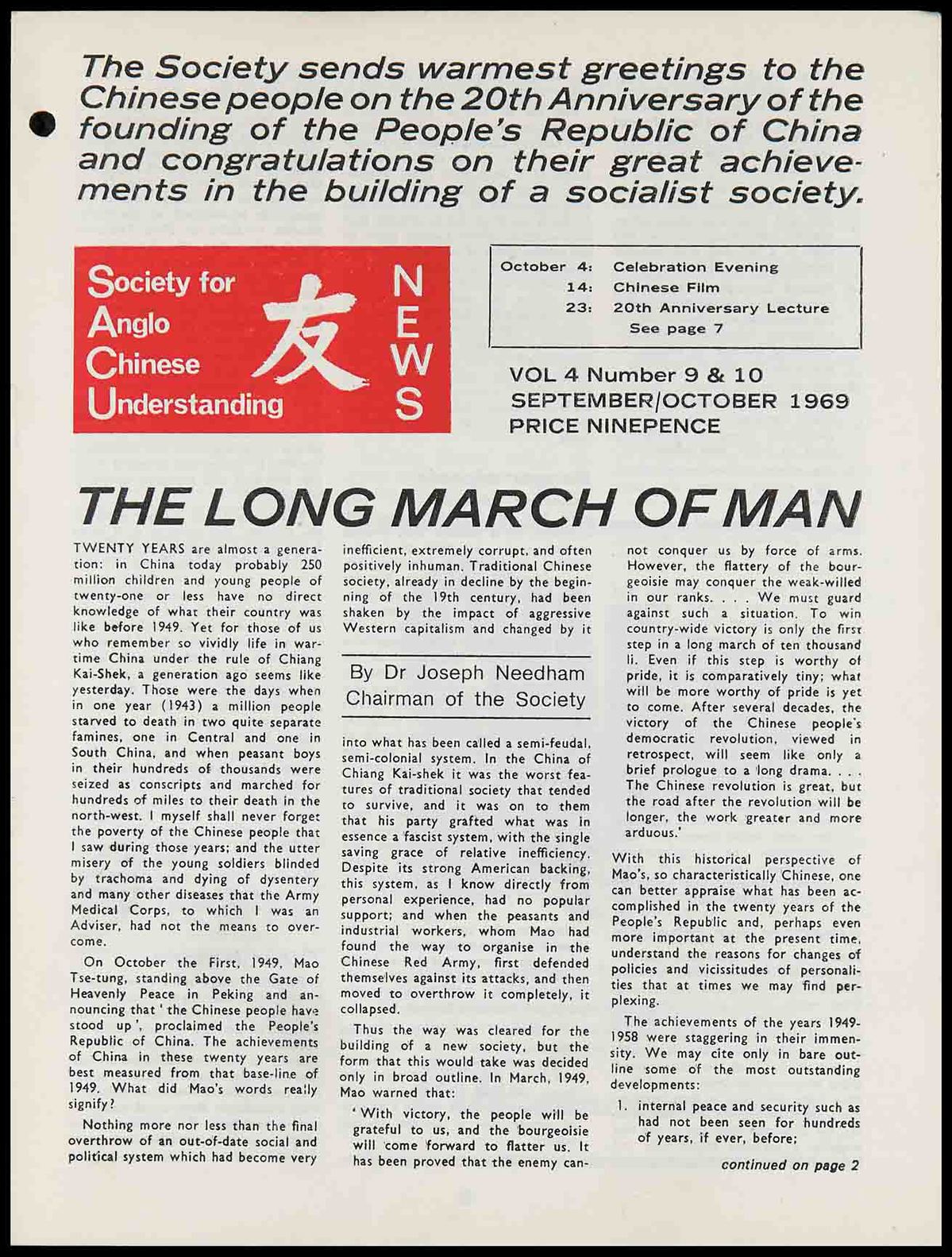
SACU News special issue for the 20th anniversary of the founding of PRC.
"I hope that through all the other modern aspects of the media, SACU will find partners, increase its reach, and expand knowledge of China, but still remembering the key goal that was spoken on that platform in 1965," he said.
"Friendship and understanding — that's the greatest need in such a dangerous and unstable world."

Tel:86-10-65363107, 86-10-65368220, 86-10-65363106